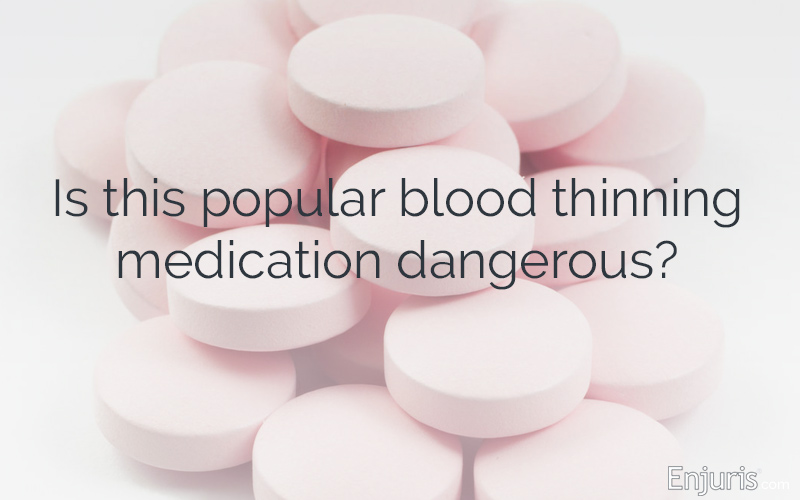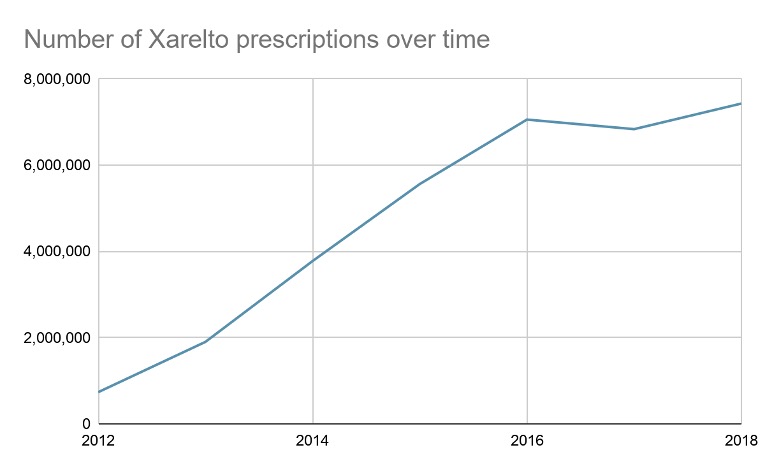
Thousands of lawsuits allege that the popular blood thinner causes uncontrollable bleeding
Roughly 3 million people take blood thinners every year in the United States. Although blood thinners save countless lives, they can also cause dangerous bleeding requiring immediate medical attention.
Over the past couple of years, one blood thinner, in particular, the popular drug Xarelto, has been the subject of thousands of pharmaceutical liability lawsuits.
Let’s take a closer look at Xarelto, why its manufacturers are being sued, and what you should do if you suffer an injury after taking Xarelto.
What is Xarelto?
Xarelto (generic name rivaroxaban) is a prescription blood thinner manufactured by Janssen Pharmaceuticals (a subsidiary of Johnson & Johnson) and Bayer Healthcare.
The drug is approved by the United States Food and Drug Administration (FDA) to:
- Reduce the risk of stroke and blood clots in patients with nonvalvular atrial fibrillation (irregular heartbeat) and in patients who recently had knee or hip replacement, and
- Treat deep vein thrombosis and pulmonary embolism.
Since Xarelto was first approved by the FDA in 2011, the popularity of the oral medication has soared.

Is Xarelto safe?
Xarelto is regularly named by consumer advocates as 1 of the most dangerous drugs in the United States. Like most medications, Xarelto has a number of side effects, including:
- Abdominal pain
- Back pain
- Bleeding
- Constipation
- Headache
- Itching
- Muscle spasms
- Nausea
- Pregnancy-related hemorrhages
Xarelto is particularly dangerous because it can cause uncontrollable bleeding, which could lead to death. To understand how that happens, it’s important to understand how blood thinners work. Blood thinners don’t actually thin your blood; rather, they prevent clots.
However, not all blood clots are bad.
Clots can help stop the flow of blood if you’re injured. The trick with all blood thinners, according to Harvard Medical School professor Dr. Gregory Piazza, is finding the right balance between helpful and harmful clotting.
You should contact your doctor immediately if you have any signs of serious bleeding after taking Xarelto or any other blood thinner. Signs of serious bleeding include:
- Unusual bruising
- Persistent nosebleeds
- Pink urine or bloody stools
- Difficulty swallowing
- Vomit that is black or bloody
- Vision changes
- Confusion
- Trouble speaking
- Weakness on one side of the body
Overview of Xarelto lawsuits
Over the last few years, thousands of patients and family members of deceased former patients filed pharmaceutical liability lawsuits against Janssen Pharmaceuticals and Bayer Healthcare.
Generally speaking, the lawsuits allege that the plaintiffs suffered from internal bleeding and wound leakage as a result of taking Xarelto.
The first 6 cases to go to trial all resulted in favorable verdicts for the drug manufacturers.
Sharyn Orr, an academic advisor at Tulane University for over 40 years, took Xarelto and later died of a hemorrhagic stroke (bleeding in the brain).
Sharyn’s husband, Joseph Orr, filed a wrongful death lawsuit against Janssen Pharmaceuticals. The lawsuit alleged that Xarelto was unreasonably dangerous. The lawsuit also alleged that Janssen Pharmaceuticals failed to state on the label that a prothrombin time (PT) test would reveal how much Xarelto was in the patient’s blood. In the emergency room, the neurosurgeon delayed operating on Sharyn’s skull because he didn’t know how much Xarelto was circulating in her body.
At trial, the plaintiff’s attorney argued that Sharyn died because she took Xarelto and because the manufacturer failed to include necessary safety labels on the medication. The defendant’s attorney argued that Sharyn had a host of medical problems and that her uncontrolled high blood pressure was the cause of her brain hemorrhage.
Ultimately, the jury sided with the defendant—Janssen Pharmaceuticals.
Nevertheless, on March 25, 2019, Bayer Healthcare and Janssen Pharmaceuticals settled virtually all of the pending Xarelto lawsuits for $775 million.
At the time, there were roughly 23,866 lawsuits pending in The United States District Court for the Eastern District of Louisiana alone. These cases had been combined as part of multidistrict litigation (MDL).
"We're pleased that these drug companies have agreed to allow all these Xarelto patients to move their claims forward after years of seeking justice," said Brian Barr co-lead counsel of the Plaintiffs' Steering Committee for multidistrict litigation. "It may have taken more than four years and six separate trials but litigation like this is an important way for consumers to have a voice in matters of drug safety."
Importantly, patients who were not part of the settlement can still file lawsuits against Bayer Healthcare or Janssen Pharmaceuticals.
How does the new Xarelto antidote impact personal injury claims?
In 2018, the FDA approved the first and only bleeding antidote for Xarelto and other similar drugs. The antidote, called Andexxa, can be administered to reverse the life-threatening or uncontrollable bleeding that may result from taking Xarelto.
The antidote may result in fewer lawsuits filed against Xarelto, but it’s unlikely to eliminate lawsuits altogether. Andexxa is incredibly expensive and many hospitals do not carry the antidote, which means you could still die or suffer serious injuries from uncontrollable bleeding after taking Xarelto.
Xarelto lawsuit FAQs
Still have questions about Xarelto?
Let’s see if we can answer some of them.
How long do I have to file a lawsuit based on Xarelto?
All states have a statute of limitations that limits the amount of time you have to file a lawsuit before the lawsuit is forever barred. Although the time period is different in every state, it’s generally between 1-4 years from the time you took the drug that caused your injury.
There are some exceptions to the statute of limitations, so it’s always best to speak with an attorney before deciding whether or not you still have time to file a lawsuit.
What is the biggest challenge in winning a Xarelto lawsuit?
Plaintiffs generally face a couple of major obstacles in Xarelto lawsuits.
First, plaintiffs need to prove that Xarelto caused their injury. This is often difficult to prove, particularly because patients typically have other health problems that could have caused or contributed to their injury.
Second, the learned intermediary doctrine holds that the drug manufacturer can escape liability for failure to warn about serious side effects if the drug manufacturer warned the prescribing physician and the physician failed to notify the patient.
Should I hire a Xarelto injury lawyer?
Pharmaceutical liability cases are complex. It’s a good idea to hire an attorney who has experience bringing claims against drug manufacturers. You can find an experienced attorney near you using our free online directory.
Connect to top-rated lawyers in seconds using our comprehensive national directory
See our guide Choosing a personal injury attorney.
